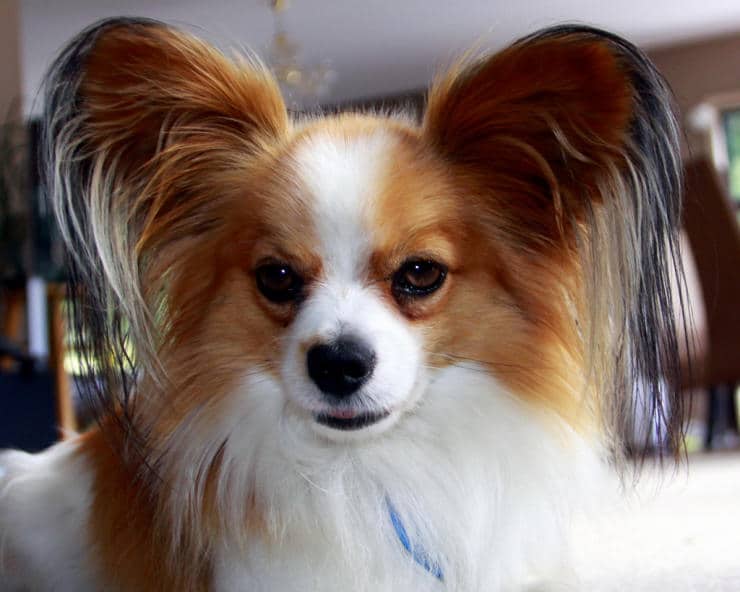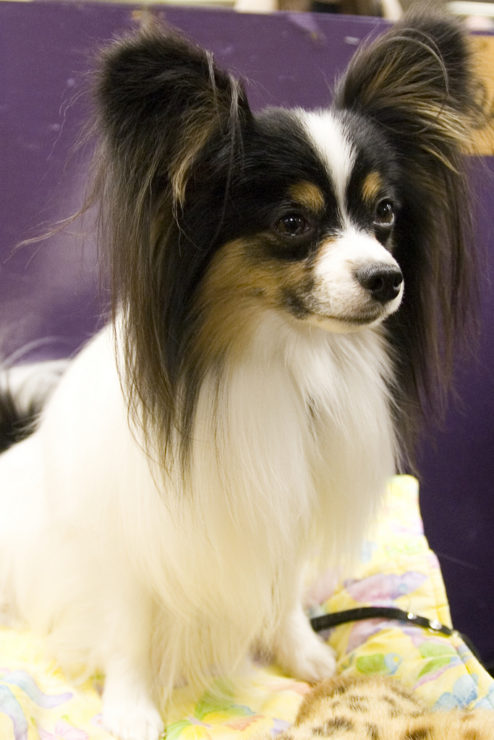Q: What are the pros and cons of owning a Papillon?
We are thinking about owning a dog, and the Papillon seems like our best bet. what are the pros and cons of owning one?

Photo Credit: W J (Bill) Harrison/Flickr CC
Answers and Views:
Answer by amanda
lots and lots of grooming. Do a little research on it first. They are one of the smartest dogs, but make sure that you and your family is ready to be committed to this dog. Search local rescue groups and adopt one!!
Answer by katelyn
Papillons DON’T need a lot of grooming!!!!!! They have a SINGLE coat. do you know what that means? IT MEANS they only need to be brushed once a week and do NOT get mats!
Answer by Jacqueline
Papillons are not a high maintenance breed for grooming, nor do they shed very much. I am a groomer who owns a Papillon, and I have about 7 regular clients who own them as well. Their hair should absolutely be brushed and combed a few times a week and bathed regularly, but again, the shedding of my dog and every other Papillon who comes to my shop is minimal unless they are a mixed breed or very neglected. They type of hair they have does not matt very easily, except for behind their ears.
Answer by D kayson
I have owned 2 papillons, neither have required a lot of grooming, and they do not shed much. I do get them groomed about every 8 weeks or so, just to be sure the fur behind their ears doesn’t get matted and to keep their butt area trimmed up.
They will bark if someone drives onto the driveway or knocks on the door, but other than barking at an occasional squirrel, they do not bark much…unlike other small breed dogs that I know.
I probably would not own one if I had small children. Although these little dogs are tougher than they appear. Both of mine have actually been larger than most…12-15 pounds.
The first one I had was very timid, but the one I have now is very, very friendly…he adores people. My present one has been exposed to far more people than my last one, who was already 5 when I got him.
They do have quite a lot of energy, but I find that in the winter, when he can’t be outside much, and it’s too cold to go for a walk, he enjoys some good playtime, and gets enough exercise by playing fetch in the house. He also loves my cat, and he and the cat do a lot playing.
Answer by ann s
If I were considering a Papillon…
My major concerns would be:
Fragility. Too many people acquire a toy breed puppy without understanding how incredibly fragile a toy breed is. You can seriously injure or kill a Papillon by stepping on him or by sitting on him when he's curled under a blanket or pillow, where he frequently likes to sleep. And Papillons can seriously injure or kill THEMSELVES by leaping from your arms or off the back of your sofa. A larger dog can grab a Papillon and break his neck with one quick shake. Owning a toy breed means constant supervision and surveillance of what's going on around your tiny dog. Papillons must always be kept indoors, in a safely fenced yard, or on-leash — they are just too easy to injure when not under your complete control.
- Should I get a Papillon dog?
- What are Papillon Dogs like as Pets?
- Should I Get a Papillon dog if I Live in a House?
Papillons are NOT suited to children, no matter how well-meaning the child. Children cannot help being clumsy, and that a child meant well is little solace to a Papillon who has been accidentally stepped on, sat on, rolled on, squeezed, or dropped onto the patio. Most Papillons feel overwhelmed by the loud voices and quick movements that children can't help making — and stress and fearfulness (even defensive biting) may be the result.

Photo Credit: audrey_sel/Flickr CC
Providing enough socialization. Papillons need extensive exposure to people and to unusual sights and sounds. Otherwise their natural caution can become shyness or suspiciousness, which are difficult to live with.
Grooming. To keep their feathered coat free of mats, Papillons require regular brushing and combing, and occasional trimming.
Shedding. Papillons shed quite a bit. Their hairs come off on your hands when you pet them and stick to your clothing, upholstery, and carpeting. Be prepared for frequent vacuuming.
Barking. Papillons are often too quick to sound the alarm at every new sight and sound. You have to be equally quick to stop them.
To teach your Papillon to listen to you, "Respect Training" is mandatory. My Papillon Training Page discusses the program you need.
Housebreaking. Toy breeds are almost always difficult to housebreak. It is so easy for them to sneak behind a chair or under a small table, and it takes only a few seconds for the deed to be done. The results can be hard to see. When you don't see it, you don't correct it — and so the bad habit becomes established. If you hope to housebreak a toy breed, consistent crate training is mandatory. Papillons should not be loosed in the house for many months until their small internal organs become strong enough for reliable control.
Know better? Give your own answer to this question!
D kayson says
The comment has been moved into the body of the post.
C dalimonte says
I have had 2 papillons, my present one is 13. I used to groom her myself as I am a hairdresser. However as she got older it was a little more difficult as she was too touchy so we take her and get her clipper cut short. She looks like a puppy and loves it! I wish i could send a picture
RussianDog says
Please do. Send a picture to admin@russiandog.net, and we’ll put it into this post.
Lorna M says
I have a part papillon/cavalier mix from ARF rescue, and he is the most lovable, special dog, besides looking adorable. People frequently stop me to pet him because he's excited to see them and be petted. Papillons can be high energy at times–I see 2 at the dog park I go to; but, they are so much fun and very handsome. I think you'll love having one. I have a pet business and hope to care for them at some point.